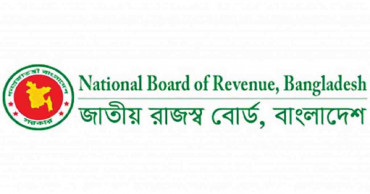black money
Change in budgtory proposal in whitening black money may be considered: Finance Adviser
Finance Adviser Salehuddin Ahmed on Tuesday hinted at some possible changes in his budgetory proposal in whitening black money in 2025-26 fiscal year.
“We are not saying that we have done a great job by giving chance to whiten black money, this might happen sometime due to compulsion, we will look into the matter,” he said.
The adviser made the statement while responding to a question at the post budget press conference held at Osmani Memorial Auditorium.
He said that the provision given in the proposed budget is to legalise the legally earned money that was not disclosed due to various reasons.
Interim govt decides to stop provision of whitening black money
“It has to aspects: one is ethical and the other is practical, we will consider the matter,” the adviser said while responding to a question.
He said that bringing back siphoned-off money is a tough job as the people involved in this are very intelligent and they use layering system for it.
He mentioned it needed time.
In this connection, he said that it took 18 years for Ferdinand Emmanuel Edralin Marcos and 20 years in Nigeria.
“We have said that it would take time, we have started the process,” he said adding that it would have been better for him to formulate the budget easily if the laudered money could be brought.
The adviser said that it would be better for him if he got more internal resources, tax and VAT.
“If we make the country corruption free, could bring back the siphoned money, then we do not need budget support from the IMF and World Bank,” he said.
He also mentioned that Bangladesh economy is now on the highway crossing the muddy roads.
9 months ago
Real estate route remains open in budget for legalising black money
Finance Adviser Dr Salehuddin Ahmed on Monday proposed to continue the opportunity to legalize undisclosed income — commonly referred to as black money — through investment in the real estate sector, including purchasing apartments or flats and constructing buildings.
Although the facility remains in place, the tax rates have been significantly increased compared to previous years, as announced in the FY2025–26 budget.
According to the proposal, the tax rates for whitening black money through real estate investments vary by location and property size. Key highlights include:
Tk 2,000 per square foot for buildings/apartments with a plinth area over 2,000 sq ft in Gulshan, Banani, Baridhara, Motijheel, and Dilkusha areas of Dhaka.Tk 1,800 per square foot for similar properties in Dhanmondi, DOHS, Mohakhali, Lalmatia, Uttara, Bashundhara, Cantonment, Siddheswari, Karwan Bazar, Banasree, Bijoynagar, Wari, Segunbagicha, Nikunja (Dhaka) and Panchlaish, Khulshi, Agrabad, Nasirabad (Chattogram).
Govt scraps black money whitening facilityTk 1,500 and Tk 600 per square foot for buildings below 2,000 sq ft in these areas, respectively.For other city corporation areas:
Tk 700 per sq ft (over 1,500 sq ft)Tk 600 per sq ft (up to 1,500 sq ft)For district municipalities:
Tk 300 per sq ft (over 1,500 sq ft)Tk 250 per sq ft (up to 1,500 sq ft)For other areas of the country:
Tk 150 per sq ft (over 1,500 sq ft)Tk 100 per sq ft (up to 1,500 sq ft)Besides, for new building construction, taxes ranging from Tk 50 to Tk 900 per square foot have been proposed, depending on location.
But, two conditions have been outlined, which are Black money cannot be legalized if it originates from any criminal activities under existing laws and it must arise from a legitimate source of income, albeit undisclosed.
Interim govt decides to stop provision of whitening black money
The interim government had previously abolished the black money whitening provision introduced by the Awami League government. That earlier facility allowed legalisation of black money through investment in land, flats, plots, and cash with lower tax rates, which drew sharp criticism for being unfair to compliant taxpayers.
Despite recurrent offers by successive governments over the years, the response to black money whitening schemes has remained limited, with critics arguing that such measures undermine ethical taxpayers and encourage illicit financial practices.
9 months ago
NBR brings back individual black money whitening opportunities in next budget
The National Board of Revenue (NBR) has decided to allow black money whitening by paying just 15 percent tax for individuals.
In the next budget for the fiscal year 2024-25, the NBR brings back the opportunity of individual black money whitening closing such opportunities as investing in Economic Zones or high-tech parks. In the last five years, the opportunity of whitening black money was available in EZs, but not a single penny of black money was being invested.
Under the new rules, black money can be turned into white without question by paying only 15 percent tax, said sources of the budget section of NBR.
According to the sources, to bring black money into the mainstream of the economy, the 2019-20 budget allowed unquestioned investment in economic zones or hi-tech parks. Then finance minister AHM Mustafa Kamal said in the budget speech that the income arising from the production of goods or services in economic zones and hi-tech parks has been given tax exemption at various rates for 10 years.
Junior finance minister gets coy over keeping provision for whitening black money in next budget
A tax of 10 percent on the money invested from undisclosed income in setting up industries in economic zones and hi-tech parks to increase investment and create employment. Such investment would not raise any question from the Income Tax Department about the source of that invested money.
After several years economic zones or hi-tech parks got the opportunity to invest black money. But no one took this opportunity in 5 years. This facility is scheduled to expire on June 30 of the current fiscal year 2023-24. Therefore, black money investment in new economic zones or hi-tech parks is not allowed as part of the advice of the International Monetary Fund (IMF).
Instead, an opportunity to legitimize black money or undeclared income is being offered under a general amnesty (tax amnesty). Of course, for this, you will have to pay more income tax than before.
HC summons BFIU chief over 'incomplete report' on black money in Swiss banks
Earlier black money could be whitened by a 10 percent tax, in the future, it will be 15 percent. If the money is legalized in this way, no other organization of the government can question this, said an official of NBR.
1 year ago
BFIU gets 3 months to sign legal pacts with 10 countries to bring back black money
The High Court has given Bangladesh Financial Intelligence Unit (BFIU) three months to sign mutual legal assistance (MLA) pacts with 10 countries for obtaining information and proof required to recover black money stashed abroad.
An HC bench of justices Md Nazrul Islam Talukder and Khijir Hayat passed the order on Wednesday (October 26, 2022).
Deputy attorney general AKM Amin Uddin Manik appeared for BFIU, while advocate Khurshid Alam Khan represented the Anti-Corruption Commission (ACC).
Read: HC orders BFIU to form research cell to bring back laundered money
In a report submitted to the court on Tuesday, BFIU said that they had advised the Financial Institutions Division (FID) to sign MLA agreements with at least 10 countries to get necessary help in bringing back laundered money from abroad.
These countries are the United States of America (USA), the United Kingdom (UK), Canada, Singapore, Australia, Malaysia, the United Arab Emirates, Switzerland, Thailand and Hong Kong (China).
The report also said that "BFIU has asked Bangladesh Bank (BB) to recruit manpower for the proposed ‘Research Cell’ which will help in identifying money launderers and recovering the money."
Read Black money whitening got little response in FY 22: NBR data
According to the report, the recruitment process is currently ongoing.
The report added that the sixth meeting of the taskforce, led by the attorney general and formed to recover laundered money, took place on January 3, 2022.
The meeting was attended by representatives of the Home Ministry, the Foreign Ministry, FID, ACC, BFIU and the Criminal Investigation Department (CID) of Bangladesh Police.
Read Finance bill 2022 passed with limits on proposal to whiten black money
It was decided at the meeting that urgent steps needed to be taken to identify the launderers and bring back black money stashed in foreign banks.
The High Court on August 31 ordered the head of Bangladesh Financial Intelligence Unit to form a research cell to prevent money laundering, bring back laundered money, monitor and control it.
Bangladesh Financial Intelligence Unit head Md Masud Biswas was also directed to submit a progress report regarding the formation of Research Cell by the next hearing set to be held on October 26.
On August 10, the Swiss ambassador in Dhaka Nathalie Chuard said that they have been providing the Bangladesh government with all information regarding deposits of Bangladeshi money in Swiss banks, "but no request has been submitted regarding any particular account".
On August 11, the High Court bench ordered the government and the Anti-Corruption Commission to explain why the government did not seek information of deposits of Bangladesh money stashed in Swiss banks.
On August 14, Bangladesh Financial Intelligence Unit was asked to submit a report in this regard in the affidavit form.
On August 21, following the High Court order, Bangladesh Financial Intelligence Unit's report was submitted stating that the information regarding deposits of 67 Bangladeshis in various Swiss banks was sought from the authorities concerned in Bern.
3 years ago
HC summons BFIU chief over 'incomplete report' on black money in Swiss banks
The High Court has summoned the head of Bangladesh Financial Intelligence Unit (BFIU) to explain an "incomplete report" filed in compliance with the Swiss envoy’s comment on black money stashed in Swiss banks.
A bench of justices Md Nazrul Islam Talukder and Khizir Hayat passed the order on Tuesday, asking Md Masud Biswas to appear before it on Wednesday and explain the report -- filed in an affidavit form -- that contains no name, address or position of the person who submitted the same.
Submitting such a report is like taking an action but without any responsibility, the court observed during the hearing.
Deputy attorney general AKM Amin Uddin represented the state while advocate Khurshid Alam Khan appeared for the Anti-Corruption Commission (ACC) during the hearing.
Khurshid said the report submitted by BFIU was not appropriate as it does not mention who submitted it and also doesn't contain any signature. "The HC was disappointed with the report," he said.
On August 10, the Swiss ambassador in Dhaka Nathalie Chuard said that they have been providing the Bangladesh government with all information regarding deposits of Bangladeshi money in Swiss banks, "but no request has been submitted regarding any particular account".
Read:Bangladesh money in Swiss Banks: Swiss envoy’s comment is embarrassing: HC
On August 11, the HC bench ordered the government and the ACC to explain why the government didn’t seek information of deposits of Bangladesh money stashed in Swiss banks.
On August 14, BFIU was asked to submit a report in this regard in the affidavit form.
On August 21, following the HC order, BFIU’s report was submitted stating that the information regarding deposits of 67 Bangladeshis in various Swiss banks was sought from the authorities concerned in Bern.
But the Swiss authorities only provided the details of one individual in this regard which BFIU also submitted to the ACC, BFIU said in its report.
According to the report, the Swiss bank published its annual report on June 16 this year. On the following day, the Swiss authorities were requested to provide necessary information about the money deposited by Bangladeshi banks and individuals in various Swiss banks through Egmont Secure Web (ESW).
However, Bangladesh has not yet received any information. BFIU even asked FIEU for this information on June 17 last, it added.
3 years ago
Black money whitening got little response in FY 22: NBR data
The number of black money holders paying taxes under an amnesty decreased by 80.83 per cent to 2300 in the FY2021-22 down from12000 in the previous fiscal year, according to latest NBR data available on Monday
In the last financial year, there was an opportunity to whiten all kinds of black money by combining the stock market, land-flat purchases, and the money kept in the bank.
But at the end of the year, it was found that despite the opportunity, only 2,300 taxpayers came forward.
Also read: Whitening black money: Stock exchanges ask NBR to continue it in stock market
The poor response is attributed to higher tax rates imposed last year.
In the FY21, the tax rate was only 10 per cent compared to 25 per cent in the FY 22.
Besides 5 per cent penalty on that tax had to be paid to whiten black money. As a result, the total tax rate stood at 26.25 per cent.
Also read: NBR dreams to cross revenue Tk3.0 lakh crore in FY 22
A top official of the National Board of Revenue (NBR) said that the response was low due to this.
Dr Iftekharuzzaman, executive director of Transparency International Bangladesh (TIB), told UNB that giving such an opportunity is unethical, discriminatory and against the constitution.
It proved that little was gained from such opportunities given at the expense of morality, he said.
Such opportunities provide protection only to the corrupt and encourage corruption, said the TIB chief.
Read Finance bill 2022 passed with limits on proposal to whiten black money
3 years ago
Finance bill 2022 passed with limits on proposal to whiten black money
The parliament has passed the finance bill 2022 with a surprise late change to the proposal on repatriation of money laundered abroad.
The opportunity in the proposed budget to bring back both movable and immovable assets has been cancelled through an amendment on the Finance Bill-2022 by the members of parliament.
Speaker of Parliament Shirin Sharmin Chowdhury chaired the session, and Finance Minister AHM Mustafa Kamal brought these amendments to the proposed budget. Later the parliament passed the bill by voice vote.
The finance minister accepted 17 amendment proposals on the finance bill at section 2-ka and 2-kha.
The other amendment proposals were cancelled by voice vote.
“Among the amendments brought in the proposed budget is that only smuggled cash can be brought into the country with 7 percent tax. Those who do not take this opportunity will be fined. The amount of the fine will be equal to the prescribed tax,” Kamal said in the parliament.
READ: Parliament passes Finance Bill, allows whitening of undisclosed money
The opportunity in the proposed budget to bring in movable and immovable assets has been cancelled. At the same time, amendments have been made to get corporate tax benefits at a lower rate.
Companies that transact more than Tk36 lakh a year through banks will get the benefit of paying corporate tax at a lower rate. In the proposed budget this limit was Tk12 lakh.
In addition, the obligation to file returns by adding e-TIN (Taxpayer's Identification Number) for all the services has also been waived. The return filing has been made mandatory only for individual taxpayers.
Along with the finance bill 2-22, the parliament has also passed the national budget for the fiscal year 2022-23 of Tk678,064 crore, which was placed in the parliament on June 9.
Finance minister AHM Mustafa Kamal presented the budget titled “Return to the Path of Development; Leaving the Covid-19 Behind”.
This is the fourth budget of the third consecutive term of the government led by Prime Minister Sheikh Hasina and also the overall 51st budget of the country.
The budget kept the GDP growth target of 7.5 percent and the GDP size estimated at Tk44.50 lakh crore.
The revenue target is set at Tk4.33 lakh crore, while the budget deficit is Tk2.42 lakh crore or 5.4 per cent of GDP. The average inflation in the budget was kept at 5.6 percent.
3 years ago
Whitening black money: Stock exchanges ask NBR to continue it in stock market
The country’s stock exchanges and merchant bankers want the National Board of Revenue to continue with the provision of whitening black money by investing in stock market with 5 per cent penalty in the upcoming budget for FY22-23.
This concession should be allowed without any question, said the members of Dhaka Stock Exchange (DSE), Chittagong Stock Exchange (CSE) and Bangladesh Merchant Bankers Association (BMBA) in their pre-budget discussion with NBR officials here on Tuesday.
They said that if this opportunity is continued, the capital market will be strengthened and the revenue of the government will increase.
Besides, money laundering from the country will also be decreased if the opportunity continues.
Taxpaying professionals will be able to invest their legally earned undisclosed money in the capital market, they said.
“I think this will reduce the risk of money laundering as the government's revenue increases,” said an official of DSE.
READ: Restaurant owners want reduction in VAT & NBR’s one-stop service
In order to further expand the capital market, it has also been proposed to reduce the corporate tax rate difference between listed and non-listed companies to at least 10 per cent and to give tax exemption to encourage SME companies to enter the capital market.
At present, the corporate tax rate of listed companies is 22.5 per cent while for non-listed companies is 30 per cent.
READ: Even government entities press NBR for tax exemption: NBR Chairman
However, tax rates for banks, insurance, financial institutions, telecom and tobacco companies are specifically fixed out of these rates.
4 years ago
No Whitening of Black Money: TIB cautious in welcoming govt’s 'realisation'
Transparency International Bangladesh (TIB), the corruption watchdog, has cautiously welcomed the government's decision to discard the provision of whitening black money in the proposed budget for the next fiscal (2021-22).
Besides, the TIB is also drawing attention to the fact that this discriminatory and unconstitutional benefit should not be included in any other way out of respect to the honest taxpayers.
Also read: Provision for black money whitening to continue: Finance Minister
The TIB has expressed concern over the lack of a clear roadmap to ensure transparency and prevention of corruption in the overall budget implementation, not just the increase in allocations to critical sectors such as the health sector to control Covid.
TIB Executive Director Dr Iftekharuzzaman in a statement on Thursday night said despite strong objections and protests from all quarters, Finance Minister AHM Mustafa Kamal allowed whitening black money in the outgoing budget.
Also read: Black money: CPD for breaking vicious circle of illicit income
“The decision of the finance minister not to renew the whitening of black money in the proposed budget for the next fiscal year can be taken as a realization of the government," he said.
The TIB Executive Director said they want to believe that the authorities will not continue this unethical benefit under the pressure of vested interests again in future, while respecting the Prime Minister's dictum of 'zero tolerance against corruption'.
4 years ago
Black money: CPD for breaking vicious circle of illicit income
Speakers at a webinar on Tuesday said only providing chance to whiten black money will not benefit the country’s economy unless the vicious circle of illicit income is broken.
5 years ago




.jpg)













